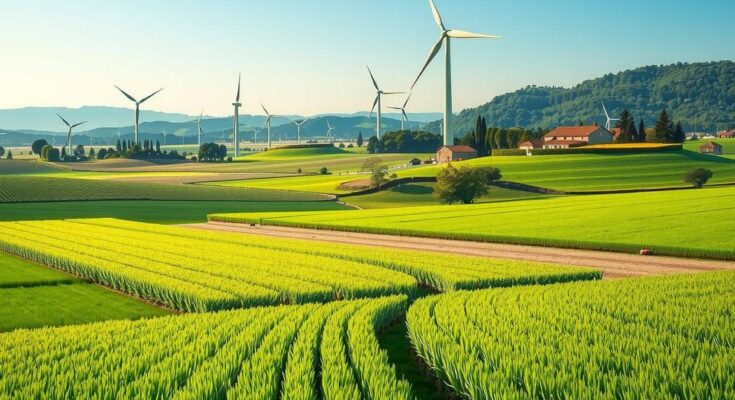Saul Luciano Lliuya, a Peruvian farmer, is suing German energy company RWE in a landmark climate lawsuit due to risks posed by a mountain lake overflowing with glacier melt. Supported by Germanwatch, he claims RWE is responsible for 0.47% of global carbon emissions and seeks financial help to build a protective dyke. This case represents a significant moment in climate litigation and highlights the accountability of large corporations for environmental impacts.
A significant climate lawsuit commenced in a German court, featuring a Peruvian farmer, Saul Luciano Lliuya, suing the German energy firm RWE. Lliuya’s home, located in Huaraz, Peru, faces potential destruction from the overflow of Palcacocha, a mountain lake filled with glacial meltwater. This lake poses a grave threat, not only to Lliuya’s residence but to approximately 50,000 others in the vicinity should it breach its banks.
Lliuya, supported by the nonprofit Germanwatch, is invoking a German property law to hold RWE accountable for its contributions to climate change, specifically citing that since 1898, RWE has been responsible for 0.47% of globally generated carbon emissions. He requests compensation equating to 0.47% of the estimated $18,000 needed to construct a dyke that would safeguard Huaraz from potential flooding.
This case marks the first of around 50 similar climate lawsuits worldwide that are seeking legal recourse against major corporations for their environmental impact. Although the verdict may not set a precedent for other jurisdictions, it offers a framework for similar lawsuits in countries with corresponding property laws like the United States. RWE contends that climate change is a global challenge with multiple contributors, denying any specific responsibility under the claim.
The residents of Huaraz are acutely aware of the risks associated with climate change; a devastating earthquake and subsequent landslide in 1970 previously resulted in the deaths of approximately 25,000 individuals in the area. The community faces broader environmental challenges, including diminished water supplies due to glacial melt, toxic streams, and an uptick in agricultural pests. “It is scary, the risk from climate change,” Lliuya expressed, emphasizing the community’s fear as water levels continue to rise.
Germanwatch’s lawyer, Francesca Mascha Klein, echoed this concern, stating the need for polluters to take responsibility and to ensure the safety of vulnerable communities like Huaraz. The proceedings are set to take place in Hamm, Germany, and are expected to span several weeks, reflecting broader implications for corporate accountability in climate-related issues.
This landmark lawsuit highlights the intersection of individual rights and global climate responsibility. Saul Luciano Lliuya’s case against RWE not only aims to protect his community from environmental peril but also serves as a potential catalyst for future climate litigation worldwide. As communities like Huaraz grapple with the dire effects of climate change, the outcome may influence ongoing debates about corporate accountability and environmental justice.
Original Source: www.wkyufm.org




